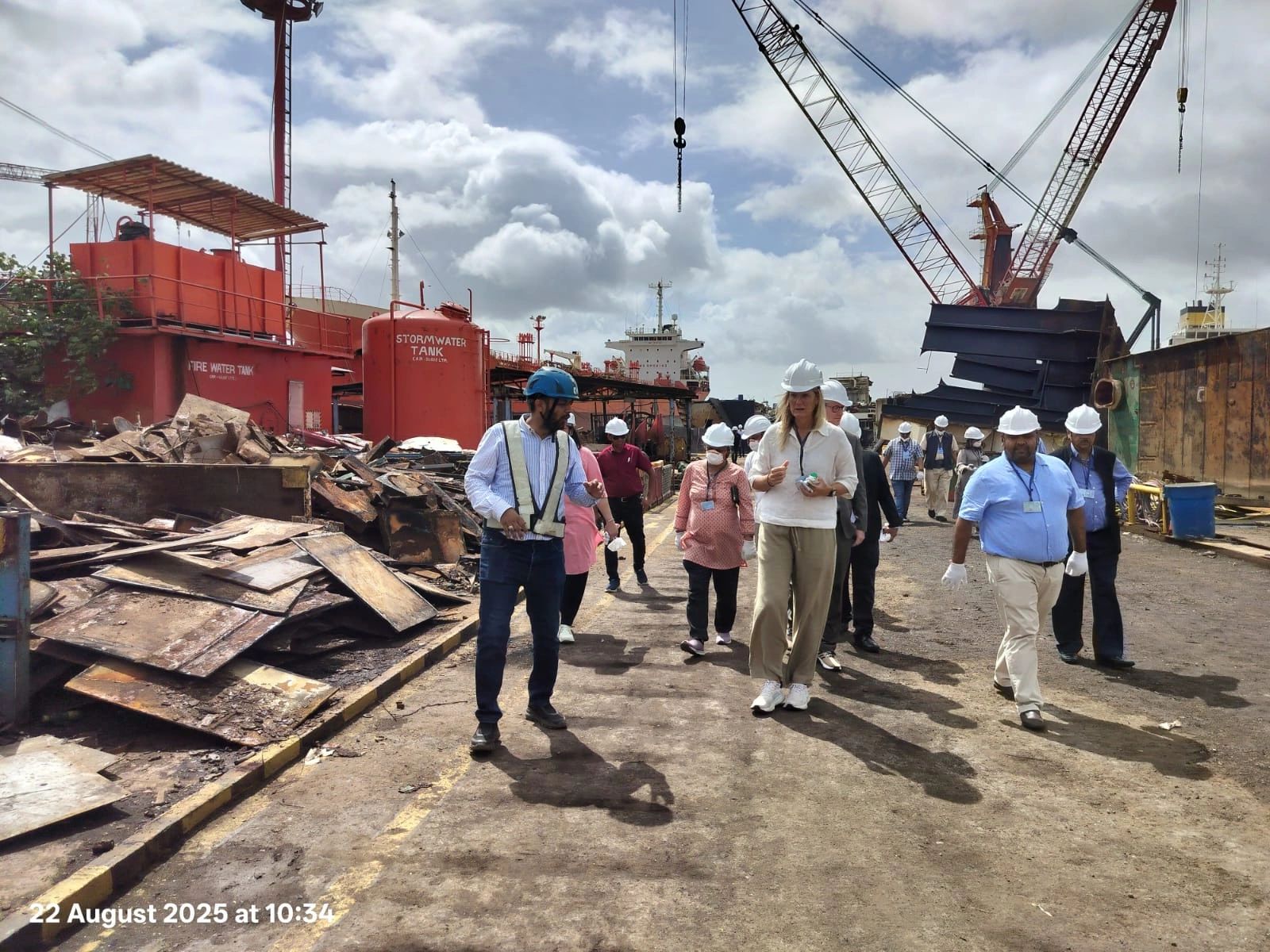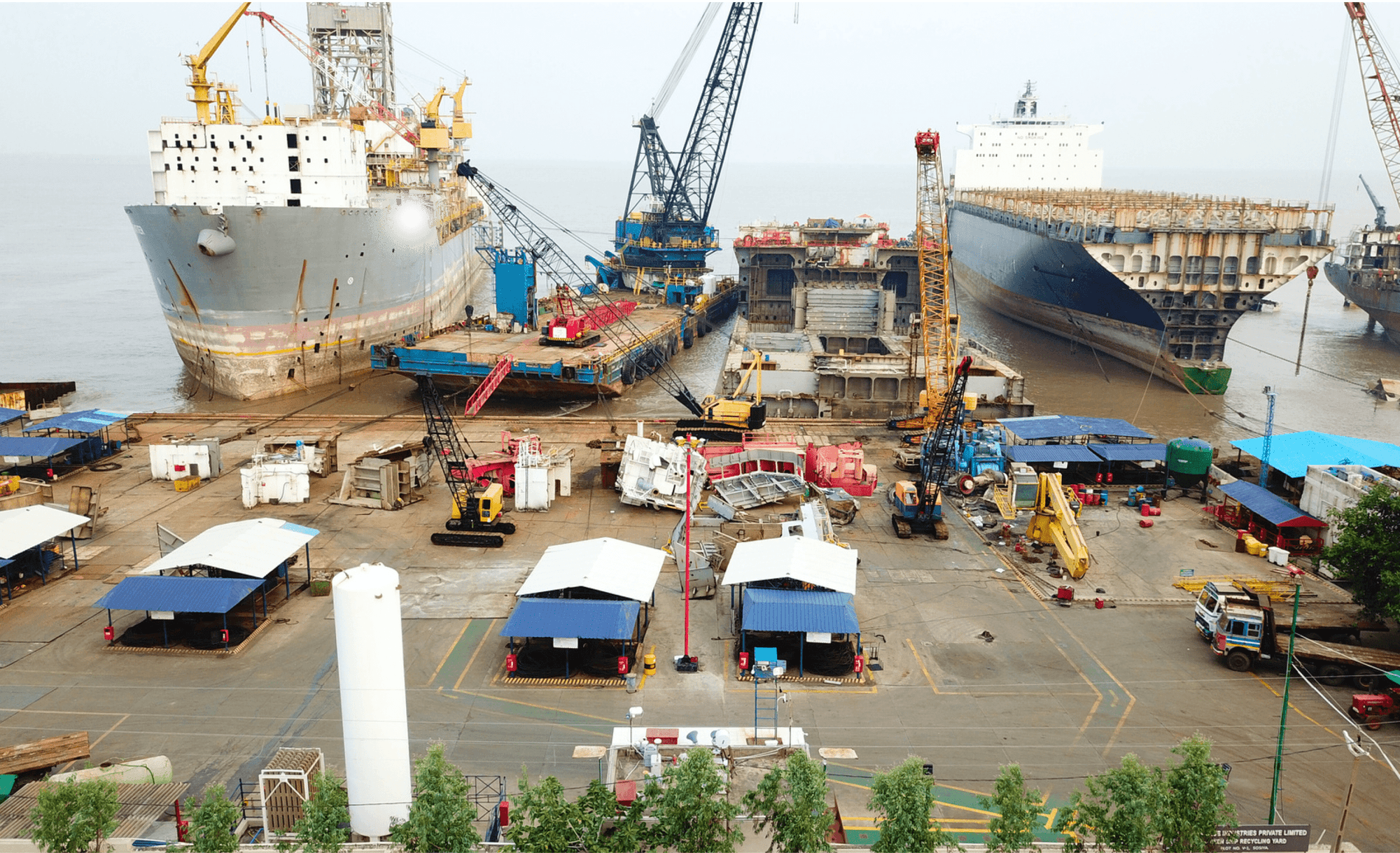Missing at Sea: Bhavnagar Port Worker Disappears from Barge Amid Safety Violations and Official Negligence
By Mahebub Kureshi | Bhavnagar | October 30, 2025

In a disturbing incident that has raised serious questions about maritime safety and regulatory oversight, a 61-year-old labourer has been missing at sea for the past 27 days after being transported illegally in a cargo barge from a ship anchored off Bhavnagar Port. The missing man, identified as Chandubhai Govindbhai Ahal, a resident of Re Nawa Bandar, Khada Slum Area, disappeared under mysterious circumstances on the night of October 2 from the barge Nand Ichchapur.
The case has triggered outrage among local communities and maritime workers, exposing how lax enforcement and disregard for safety rules have turned dangerous practices into routine operations at Bhavnagar’s ports.
The Missing Worker
According to police and eyewitness accounts, Chandubhai was among a group of labourers who were taken aboard Nand Ichchapur, a cargo barge used to ferry coal from the bulk carrier MV Vishwa Bandhan anchored at Bhavnagar anchorage. The ship had arrived on September 23, carrying 53,840 metric tons of coal destined for unloading at the Bhavnagar New Port.
Labourers were hired on contract to unload the coal directly from the vessel into barges. These barges, designed strictly for cargo transportation, are not permitted to carry passengers. Despite this, it has become a common but illegal practice to transport workers to and from the ship using such vessels.
On the night of October 2, Chandubhai reportedly went to the deck of the barge after his shift and was not seen again. Fellow workers initially believed he might have fallen overboard. His colleagues and family launched a desperate search, but even after several days of combing the nearby waters, no trace was found.
A formal complaint was later lodged at the Port Marine Police Station, Bhavnagar.
“As per the advice given by his family and colleagues, the areas were searched by boat but no trace was found. A complaint has been filed in this regard,” said M.C. Chudasama, Police Inspector, Port Marine Police Station, Bhavnagar.
A Violation of Maritime Safety Protocols
The tragedy has brought to light long-standing safety violations in local port operations. Barges transporting goods are explicitly prohibited from carrying passengers, yet many continue to do so with impunity.
Following the incident, the Gujarat Maritime Board (GMB) reiterated its safety regulations through a Marine Safety Circular, emphasising that only authorised passenger boats with valid certification should be used to transport workers between ships and the shore.
The circular outlines several key safety protocols that must be followed by all operators:
-
Certified marine craft must be used for carrying passengers.
-
The Certificate of Survey must clearly indicate passenger capacity excluding crew members.
-
The craft must hold a valid safety certificate and permission to carry passengers other than crew.
-
Night-time movement of workers on deck is strictly prohibited.
-
Safety briefings must be conducted for all workers before deployment.
-
A responsible supervisor must be present on the barge at all times.
-
An adequate number of life jackets and emergency equipment must be maintained onboard.
Despite these clear rules, industry insiders say such guidelines are often ignored. Local observers allege that enforcement agencies, including some officials within the GMB, have been complacent — if not complicit — in allowing such unsafe practices to persist.
Did Bhavnagar Port Turn a Blind Eye? Calls for Probe into Illegal Barge Transport of Workers
Questions are being raised after reports that contractual labourers were transported in cargo barges that are not certified to carry passengers. Sources say the movement appears to have occurred with the knowledge — or at least the inaction — of the Bhavnagar Port officer responsible for overseeing shore-to-ship and ship-to-shore transfers. The Gujarat Maritime Board (GMB) is urged to open a prompt and thorough inquiry, verify whether safety rules and its Marine Safety Circular were breached, and take stringent disciplinary and legal action if negligence or malpractice is found. Families and worker-safety advocates demand transparency and immediate corrective measures.
Official Apathy Under Scrutiny
Maritime experts and labour activists argue that the tragedy is not an isolated incident but part of a pattern of neglect that endangers lives. They point out that Bhavnagar, a key port on Gujarat’s western coast, has seen repeated cases where cargo barges double as passenger transport, despite having no safety certifications for human movement.
“The rules exist on paper, but they are rarely enforced on the ground,” said a senior marine operations manager on condition of anonymity. “Labourers are often transported in unsafe conditions because it’s cheaper and faster than arranging authorised boats.”
What is most troubling, activists say, is the apparent indifference of officials tasked with ensuring compliance. “When such incidents happen, blame is shifted to the workers or the contractors,” said a local maritime labour union leader. “But the real accountability lies with the GMB officers who issue or overlook permits that allow such violations to continue.”
MV Vishwa Bandhan and the Coal Operations
The MV Vishwa Bandhan, a bulk carrier, has remained anchored off Bhavnagar since late September. The ship’s cargo — coal imported through Seascape Shipping — is being gradually unloaded via barges that shuttle between the anchorage and the New Port Jetty.
Industry sources say such operations have become increasingly frequent as Bhavnagar Port handles more cargo imports. However, with the surge in shipping activity, safety oversight has not kept pace, particularly regarding temporary and contract labour.
The port relies heavily on daily wage workers who board barges under unsafe conditions, often at night, without proper protective gear or life-saving equipment. Chandubhai’s disappearance has underscored how this informal system exposes vulnerable labourers to fatal risks while the larger machinery of trade continues uninterrupted.
The Human Cost of Negligence
Chandubhai’s family remains in anguish, caught between fading hope and unanswered questions. His wife and children, residents of Bhavnagar’s Khada Slum Area, have pleaded for continued search operations and justice for what they call a “preventable tragedy.”
“He went to work like every other day. If the rules were followed, he would have come back home,” said a relative.
The family has also alleged that the contractor who hired Chandubhai failed to provide any compensation or support following the incident.
Local community groups have now demanded a judicial inquiry into the case, urging the state government to identify and penalize those responsible for allowing unsafe transport practices.
GMB’s Response
In response to growing criticism, the Gujarat Maritime Board has sought to reinforce safety compliance across all its ports. Officials have circulated directives to private operators and contractors, reminding them that tampering with human safety will not be tolerated.
A section of the GMB’s statement reads:
“Certified passenger boats should be used to transport workers from ship to shore and shore to ship. Cargo barges are not authorized to carry passengers under any circumstances. The concerned operators and supervising officials are liable for action in case of violation.”
A Call for Accountability
The incident has reignited a broader debate over maritime labour safety and regulatory accountability in Gujarat’s coastal ports — from Bhavnagar to Alang. While Gujarat is a hub of India’s shipping and ship-recycling industries, observers note that infrastructure and safety enforcement for contract workers lag far behind the rapid expansion of port operations.
“If human life is treated as expendable in the name of efficiency, we’ve failed as a maritime nation,” said a retired GMB officer. “Every life lost at sea under such circumstances is a reflection of systemic failure.”
The message from the local community and maritime experts is clear: “Stop the tampering with human life.”
Strict enforcement of maritime safety norms, accountability for negligent officials, and improved welfare measures for port workers are not just administrative necessities — they are moral imperatives.
As the sea continues to keep its silence on the fate of Chandubhai Govindbhai Ahal, his disappearance stands as a grim reminder of the cost of neglect — a cost borne by those at the very bottom of the maritime chain, whose lives are too often lost, and too easily forgotten.
Author: shipping inbox
shipping and maritime related web portal









